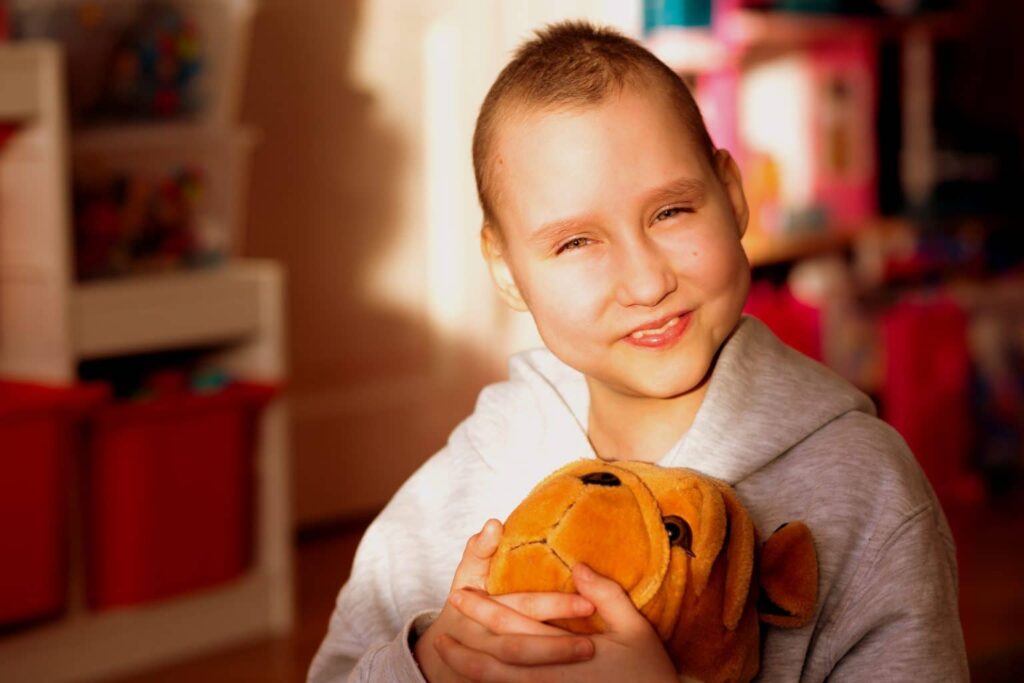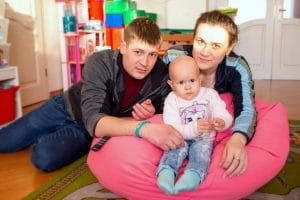


"To tell my child that she has cancer? Such news will kill her..." - this is what many parents who are faced with this misfortune think. And yet it is necessary to speak. Specialists from different countries, referring to their own experience, believe that knowing the truth about what is happening to them, the child will consciously treat themselves. Parents do not need to come up with new reasons every time to make him or her endure painful procedures, medications, and serious restrictions - he or she understands why it is necessary. And in general, deception and uncertainty are exhausting, while the truth is liberating, despite the pain it brings.

It's a paradox, but once a child realizes his or her condition, he or she worries less. The unknown gives rise to bigger monsters. But as soon as you look the fear in the eye, it begins to weaken.
Psychologist Mariana Nych explains.
One picture sticks in my mind. A mother walks down the hospital corridor for more than an hour, not daring to enter her teenage son's room after the doctor tells her the terrible news. She talks to someone on the phone, never ceasing to cry. When I looked into her boy's room, the first thing I saw was his eyes filled with anxiety. He was desperately waiting for his mom. Realizing how hard this wait was for him, I went to his mother, stopped the phone conversation and tried to explain why it was most important to share my feelings with my son. She should finally come into the ward and start talking to her child about his illness.
As adults, we often underestimate our children, thinking they are weak and naive. In fact, they are stronger and wiser than we are. You can't hide anything from them - they can easily pick up on our state of mind. When they see that something incomprehensible is happening to us, they transfer it to themselves, concluding that the reason is hidden in them. Guessing or accidentally finding out about your illness, the feeling of guilt can be exacerbated: "I got sick because I did something wrong. My mom is silent and crying - I offended her."
That is why it is so important to tell a child with cancer that it is not his or her fault. And no "bad" actions have anything to do with it. There was a malfunction at the cellular level in his body. Only chance is to blame and nothing else.
Sometimes parental words are not enough. "They just calm me down," the child thinks and continues to silently reproach himself. In this case, we, psychologists, can help. Without dealing with this issue, it will be difficult to be treated and even more so to recover.
The root of the problem may be hidden behind an accidentally overheard conversation about a birth trauma or an act that the child committed, hid, and is guilty of. In this case, it is difficult to confess to the mother, but it is easier to talk to us.
The doubts of a child who is at the beginning of treatment can be dispelled by his or her experienced peers, who are already more comfortable talking about their experiences: "Yes, I understand you. At first I also thought that my illness was a punishment for my actions. Now I am sure that it is not."
Cancer is a disease that can happen to anyone. No one is immune to it. But it is important to know that today, in the 21st century, it is a curable disease. And this is the most important thing. I realized that leukemia is a part of my life, a part of the past that cannot be erased or forgotten. And I learned to live with it...
(from a letter by Olena Matushevska, a cancer survivor)
If parents feel ready to talk to their child about their illness, they can start the conversation themselves. It is better to do it together. Even if mom used to communicate more with her son or daughter, this time dad should be there. Parents need to know what to say to their child if he or she wants to know something specific about the disease. The doctor will help them with this, explaining to the child everything he or she wants to know without going into difficult terms.
But this is not enough, and hundreds of other questions arise: what about school? Friends? What about the usual way of life? What will happen to my appearance? When can I go home? What is it like to live in a hospital?
A psychologist will help you deal with all this, not only by explaining everything that is not clear from what the doctor said, but also by answering many questions that arise for anyone who finds themselves in such a situation.
From 2 to 7
At this age, children are usually very attached to their parents. Everyone else is a stranger to them. So, first and foremost, mom and dad should be there for them.
If the child is very young, you can talk to him or her about the disease in his or her usual language - with the help of fairy tales and picture books. For example, such as Radio Robbie. This is a series of coloring stories about a kind and strong hero Robbie who fights against evil cancer cells.
Sometimes it happens that a cell loses its mind. It becomes mad and angry and does not want to live with other cells in your body. This cell is called a cancer cell. The other cells are also angry with the cancer cell because it pushes everyone around and doesn't give them peace. Unfortunately, the cancer cell does not care about everyone. It very quickly gives birth to people just like it - unreasonable angry people. A whole flock of them is formed.
Fortunately, some blood cells have a special weapon with which cancer cells can be destroyed. When all the cancer cells are destroyed, the rest of us rejoice. It is not always easy. Sometimes you need help. Who can help you? Many helpers live in the hospital, for example, Radio Robbie. He is the main character of our story.
(excerpt from the book Radio Robbie and His Fight Against Evil Cancer Cells)
 In such books, kids find an incentive to drink their medicine and eat their porridge, even if they have no appetite. One boy, for example, took a small hammer (like Robbie's) with him when he sat down to eat. It helped him eat and gain strength. He banged the hammer every time he ate a spoonful of porridge, imagining that he was destroying bad cells in this way. It was a great relief for his mother, because before that, the baby refused to eat.
In such books, kids find an incentive to drink their medicine and eat their porridge, even if they have no appetite. One boy, for example, took a small hammer (like Robbie's) with him when he sat down to eat. It helped him eat and gain strength. He banged the hammer every time he ate a spoonful of porridge, imagining that he was destroying bad cells in this way. It was a great relief for his mother, because before that, the baby refused to eat.
"How Marta Got Leukemia" is another book to help parents who don't know how to tell their child that he or she is sick. It was written by parents whose children have gone through all the stages of treatment and recovered. Often adults are afraid to read it, and children are vice versa. Martha's story shows their personal side, and it makes it easier for them to accept everything that happens. For them, Marta is a strong and courageous friend whom they want to follow: "If she can do it, I can do it!"
The medicines Marta takes are called cytocystatics. They come in different colors: yellow, pink and clear. Once the doctor called the yellow medicine golden.
"Are they really made of real gold?" asked a surprised Marta Slon.
"No," her friend smiled gently at her, "but those nasty evil blood cells are terrified of this medicine. That's why they have to run away. They will help you, and we will play again, just like before!
(excerpt from the book How Marta Got Leukemia)
When we are very sad, and even more so in pain, we cry or scream. Nature has taken care of this - it makes it easier to endure physical and mental suffering. The procedures that children undergo are difficult even for adults to endure. In a conversation with a sick child with cancer, you cannot forbid them to express their emotions. "Don't cry!", "Be patient", "It doesn't hurt" - all these persuasions not only do not work, but also harm, because moral suffering is added to physical suffering: "I am a coward. They do not believe me that it is very, very painful. I upset my mother...".
I remember how relieved one boy who was having a puncture looked at his mother when he heard me say that he could cry and even scream because it really hurt: "Mom, can I really cry?". My mother was also relieved to hear that I could cry when it hurt, which meant that it was not a shame, as she had always been taught, but a necessity.
From 12 and older
At this age, children are unlikely to be satisfied with fairy tales to explain. When telling a child that he or she is sick, you need to be prepared for an honest conversation. The first conversation should involve a doctor who can scientifically convince a doubting teenager that cancer cannot be caught and that, with rare exceptions, this disease does not depend on external factors.
Before going to the doctor for an explanation, parents should tell him or her what the child already knows and what he or she does not.
It is important to take into account the individual psychology of communicating with a seriously ill child. And before going to the doctor for an explanation, parents should inform him or her what the child already knows and what he or she does not.
Finding out the truth about your serious diagnosis is not all. The child needs to know a lot more: about treatment, which can last more than a year; isolation, painful procedures, possible surgeries. It is unacceptable to tell all the details at once. Each stage requires a separate conversation, which both parents and the doctor need to prepare for.

I remember how I was kicked out of the hematology room and how long I waited for my mother in the corridor, who came out of the doctor's office in tears. I realized that I was seriously ill. Everything collapsed instantly. I was not allowed to go to school, dance, see my friends, and in general, "I can't!" was the phrase I kept hearing that upset me the most. Since then, the ward has become my second home...
(from a letter by Olena Matushevska, a cancer survivor)
17-18 years old
Older teenagers are already well aware that cancer is a deadly disease. Thanks to Google, they know a lot about their disease, and sometimes they can't tell the difference between truth and fake news. That is why it is so important that the conversation with them is not only honest and open, but also competent.
Adult children ask us direct questions and need the same answers. Our children do not always perceive what we say the way we would like them to. It's important to find these misunderstandings and explain everything, and only a psychologist can do this.
It is also difficult to talk to a child with cancer at this age because it is a period of parent-child conflict and painful separation from each other. Overprotection, violation of the teenager's boundaries - all this aggravates the situation and demotivates him to undergo difficult treatment. While communication with his peers who have gone through the same thing and recovered is exactly what is needed.
After each block of chemotherapy, of which I had 5, I felt very bad. I had no strength, no mood, I wanted nothing. Over time, it got better and I was allowed to go home for a while. Those were the happiest moments. At home I forgot that I was sick. I was always in a good mood at home, I was happy about everything. And then it was very difficult to return to the hospital again. But I was strong and resilient enough. I was patient and knew I had to fight. I believed that I would be cured...
(from a letter by Olena Matushevska, a cancer survivor)
Our Camp of Winners was organized for this very purpose - to show that cancer can be cured and that most children beat the disease. It's also an opportunity to talk to those who understand you well about things you would never ask an adult, no matter how wise they are.
Many years have passed and now I have become a volunteer. I knew that I felt that someday I would want to come back to this and help children with cancer, as I had once been helped. I will give them the most important thing - hope and faith in themselves, in recovery. I will show them by my example that cancer is not a sentence. Cancer is curable. The main thing is not to give up and fight to the end. This is the only way to overcome it!
Read more about the Winners' Camp.
Psychological support hotline fromPledges» the number 0 800 4000 23 is available: